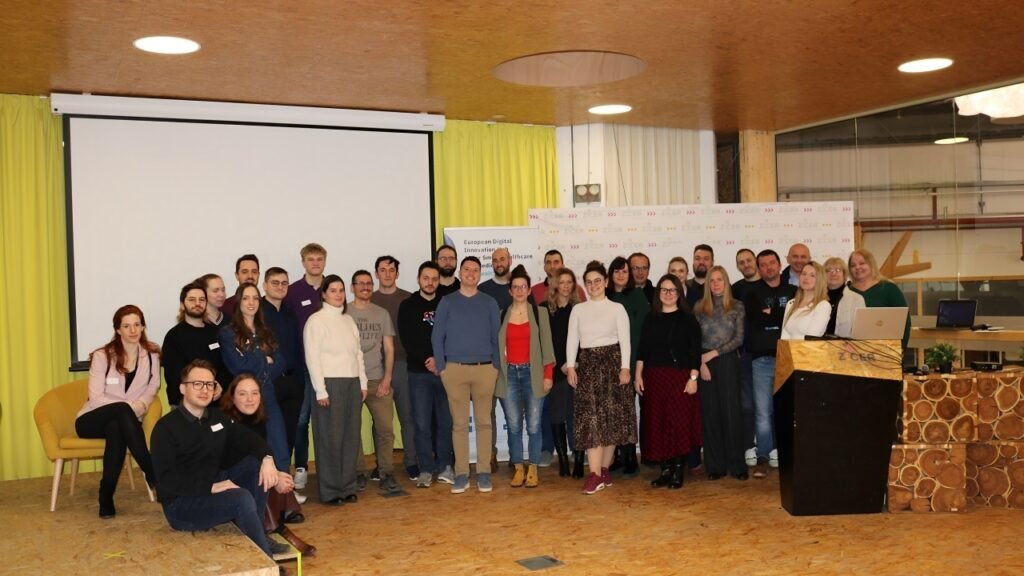AI4Health.Cro presented in February 14 ambitious teams who will participate in an innovation competition with a mission to develop AI applications to enhance the detection of potentially cancerous lesions in mammography images.
The call for applications, which opened in December 2024, saw 34 teams comprising 106 competitors—IT experts, innovators, and healthcare professionals—eager to tackle the challenges of breast cancer diagnostics. After a rigorous evaluation, 14 of the best teams were selected to present their prototypes at a kick-off event held at the Zagreb Innovation Center (ZICER). These teams now continue in the competition, vying for a prize pool worth €9,000.
Competitors hail from various parts of Croatia, including Čakovec, Karlovac, Osijek, Split, and Zagreb. The teams moving forward in the competition include Breast Friends, BreastQuestAI, Code to Heal, D308, Deregularizatori, GANga, Guard(AI)ns of Precision, JMM Kronos, MDT, MediSense, OncoVision, ProtostarLabsTeam, and SCIOM.
“The fact that we had over 100 applicants for this niche AI4Health.Cro innovation competition confirms a strong interest and desire to contribute to the healthtech sector. Congratulations to all teams kicking off today against stiff competition. ZICER’s mission is to foster innovations that make real-world changes. By supporting such projects, we are developing technological solutions and laying the foundation for a healthier society. We are proud to be part of a story that could revolutionize healthcare in Croatia,” said Frane Šesnić, Director of ZICER.
How Can AI Help Improve Breast Cancer Diagnostics?
Breast cancer is the most common malignant tumor among women globally and is responsible for over 670,000 deaths annually. Early diagnostics can literally be a lifesaver, and national breast cancer screening programs have proven crucial in saving lives by enabling timely mammographic screenings. However, the system is under significant strain due to the increasing volume of images that need processing and a shortage of skilled personnel, particularly affecting access in rural areas. This is where artificial intelligence steps in.
“AI-based solutions can significantly speed up and simplify the analysis of mammographic images, enabling faster and more accurate diagnostic decisions. This aids radiologists, relieves the healthcare system, optimizes resources, and directly contributes to better patient care,” explained Dr. Anja Barešić, coordinator of AI4Health.Cro and head of the Laboratory for Computational Biology and Translational Medicine at the Ruđer Bošković Institute (IRB).
Goal: AI Solutions Applicable in Clinical Practice
“Competitors will tackle four intriguing challenges that examine how artificial intelligence can assist in analyzing mammographic images. First, they need to develop an AI model that recognizes and classifies breast lesions according to the BI-RADS system, crucial for assessing breast cancer risk. Second, they must highlight suspicious areas on the images, just as an experienced radiologist would. The third challenge involves explaining how their model reaches conclusions, helping to uncover significant patterns and potential biases. Lastly, the fourth challenge is to design a straightforward and useful interface that eases doctors’ interpretation of the results, providing clear and reliable diagnosis explanations,” detailed Dr. Tomislav Šmuc, head of the Department of Electronics at IRB and the science and technology coordinator for the AI4Health.Cro project.
To address these challenges, competitors will use real, anonymized mammographic data, with strict privacy protection, thanks to the cooperation of AI4Health.Cro Center with hospitals and clinics. This ensures the developed technologies are truly applicable in everyday clinical practice. The massive computing resources required for the tasks have been provided by the Ruđer Bošković Institute and the University Computing Center (SRCE).
The Grand Finale in April!
The top three teams will showcase their solutions in April at the annual conference of the AI4Health.Cro Center, gathering leading experts from healthcare and AI technology. Will there be a solution among them that will change the future of breast cancer diagnostics? Only time will tell, but one thing is certain—the race has begun!
This competition is part of the AI4Health.Cro project activities funded by the EU under the DIGITAL Europe and NextGeneration-EU programs and is implemented with the support of the University Computing Center (SRCE).

